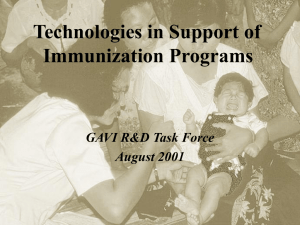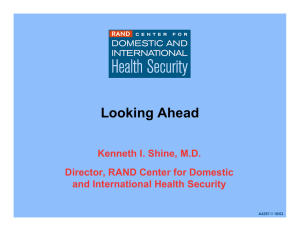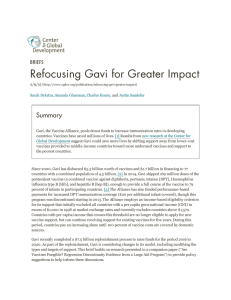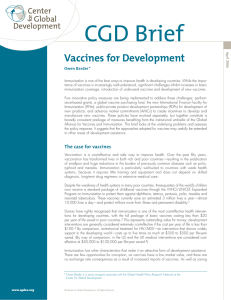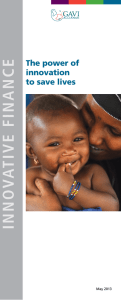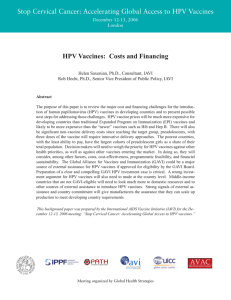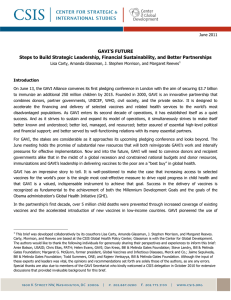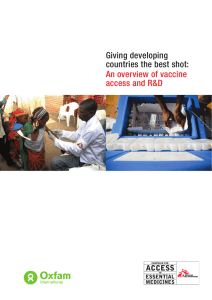Keep Hope
advertisement
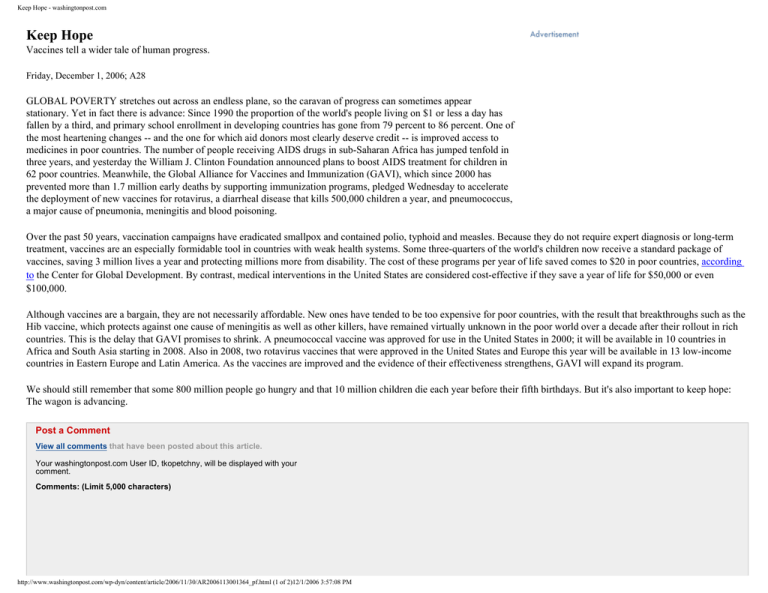
Keep Hope - washingtonpost.com Keep Hope Vaccines tell a wider tale of human progress. Friday, December 1, 2006; A28 GLOBAL POVERTY stretches out across an endless plane, so the caravan of progress can sometimes appear stationary. Yet in fact there is advance: Since 1990 the proportion of the world's people living on $1 or less a day has fallen by a third, and primary school enrollment in developing countries has gone from 79 percent to 86 percent. One of the most heartening changes -- and the one for which aid donors most clearly deserve credit -- is improved access to medicines in poor countries. The number of people receiving AIDS drugs in sub-Saharan Africa has jumped tenfold in three years, and yesterday the William J. Clinton Foundation announced plans to boost AIDS treatment for children in 62 poor countries. Meanwhile, the Global Alliance for Vaccines and Immunization (GAVI), which since 2000 has prevented more than 1.7 million early deaths by supporting immunization programs, pledged Wednesday to accelerate the deployment of new vaccines for rotavirus, a diarrheal disease that kills 500,000 children a year, and pneumococcus, a major cause of pneumonia, meningitis and blood poisoning. Over the past 50 years, vaccination campaigns have eradicated smallpox and contained polio, typhoid and measles. Because they do not require expert diagnosis or long-term treatment, vaccines are an especially formidable tool in countries with weak health systems. Some three-quarters of the world's children now receive a standard package of vaccines, saving 3 million lives a year and protecting millions more from disability. The cost of these programs per year of life saved comes to $20 in poor countries, according to the Center for Global Development. By contrast, medical interventions in the United States are considered cost-effective if they save a year of life for $50,000 or even $100,000. Although vaccines are a bargain, they are not necessarily affordable. New ones have tended to be too expensive for poor countries, with the result that breakthroughs such as the Hib vaccine, which protects against one cause of meningitis as well as other killers, have remained virtually unknown in the poor world over a decade after their rollout in rich countries. This is the delay that GAVI promises to shrink. A pneumococcal vaccine was approved for use in the United States in 2000; it will be available in 10 countries in Africa and South Asia starting in 2008. Also in 2008, two rotavirus vaccines that were approved in the United States and Europe this year will be available in 13 low-income countries in Eastern Europe and Latin America. As the vaccines are improved and the evidence of their effectiveness strengthens, GAVI will expand its program. We should still remember that some 800 million people go hungry and that 10 million children die each year before their fifth birthdays. But it's also important to keep hope: The wagon is advancing. Post a Comment View all comments that have been posted about this article. Your washingtonpost.com User ID, tkopetchny, will be displayed with your comment. Comments: (Limit 5,000 characters) http://www.washingtonpost.com/wp-dyn/content/article/2006/11/30/AR2006113001364_pf.html (1 of 2)12/1/2006 3:57:08 PM Keep Hope - washingtonpost.com Post Comments that include profanity or personal attacks or other inappropriate comments or material will be removed from the site. Additionally, entries that are unsigned or contain "signatures" by someone other than the actual author will be removed. Finally, we will take steps to block users who violate any of our posting standards, terms of use or privacy policies or any other policies governing this site. Please review the full rules governing commentaries and discussions. You are fully responsible for the content that you post. © 2006 The Washington Post Company Ads by Google Try Lunesta for Free Free samples of non-narcotic Lunesta using our free trial offer. www.lunesta.com Sleep Medication Learn About a Prescription Option Register for Our Free Newsletter SleepMedication.Info The Vaccine Controversy Did You Know That No Studies Prove Vaccinated Children Are Healthier? www.rohlfsen.com/vaccinetalk.htm http://www.washingtonpost.com/wp-dyn/content/article/2006/11/30/AR2006113001364_pf.html (2 of 2)12/1/2006 3:57:08 PM

